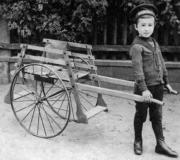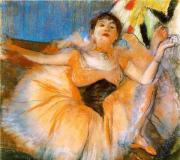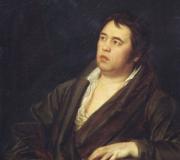What is the name of the visitor? Biography of Boris Zakhoder, writer, poet, playwright and translator
Boris Vladimirovich Zakhoder was born on September 9, 1918 in the Moldavian city of Cahul. Boris's father volunteered for the Russian army back in 1914, and his mother was a nurse at that time. Here, in Kogul, they met and got married.
The Zakhoder family did not live in Moldova for long: first they moved to Odessa, and then moved to Moscow. My father graduated from Moscow University and began working as a lawyer. His mother, an educated woman who knew several foreign languages, worked as a translator.
In 1935, Boris Zakhoder graduated from school, went to work at a factory as a turner's apprentice, later went to study at the Moscow Aviation Institute, then continued his studies at the biological faculties of Moscow and Kazan universities (he was interested in biology since childhood). But his love for literature won: in 1938 he entered the Literary Institute. A.M. Gorky.
He took part in the Soviet-Finnish and Great Patriotic Wars, where he volunteered. He was an employee of the army press. In the short interval between the two wars, he wrote poems and essays about the construction of VDNH - the Exhibition of Achievements of the National Economy.
In 1946, Boris Zakhoder returned to Moscow and graduated from the Literary Institute the following year. Boris Zakhoder published his first children's poem "Battleship" in the same year under the pseudonym Boris Vest in the magazine "Zateinik". The famous writer Lev Kassil spoke highly of the work of Boris Zakhoder, predicting great fame for the poet. Zakhoder’s works were published in the newspaper “Pionerskaya Pravda”, the magazine “Murzilka”, Boris Vladimirovich published collections of poems “On the back desk” (1955), “Martyshkino tomorrow” (1956), “Nobody and others” (1958), “Who is against whom similar" (1960), "To Comrade Children (1966)", "School for Chicks" (1970), "Calculations" (1979), "My Imagination" (1980), "If they give me a boat" (1981), etc.
Boris Zakhoder also tried his hand at drama: “Rostik in the Deep Forest”, “Mary Poppins” (both 1976), “The Wings of Thumbelina” (1978; the last two co-authored with V. Klimovsky), “Alice’s Adventures in Wonderland” (1982 ); Zakhoder is the author of the libretto for the opera "Lopushok at Lukomorye" (1977), a play for the puppet theater "Very Smart Toys" (1976).
Zakhoder’s works written in prose are deservedly popular: the book of fairy tales “The Monkey’s Tomorrow” (1956), “The Good Rhinoceros” (1977), “Once Upon a Time Fip” (1977), the fairy tales “The Gray Star” (1963), “The Little Russ” (1967), “The Hermit and the Rose” (1969), “The Story of the Caterpillar” (1970), “Why the Fish Are Silent” (1970), “Ma-Tari-Kari” (1970), “The Tale of Everyone in the World” (1976 ) and others.
Boris Vladimirovich Zakhoder became very famous for his translations of famous foreign children's fairy tales: A. A. Milne's story "Winnie the Pooh and All-All-All" (1960), P. Travers "Mary Poppins" (1968), L. Carroll " Alice's Adventures in Wonderland" (1971–1972), fairy tales by Karel Capek, the Brothers Grimm ("The Musicians of Bremen", 1982, etc.), J. M. Barrie's play "Peter Pan" (1967), poems by L. Kern, Y. Tuwim, W. J. Smith, J. Brzechwa and others.
Boris Zakhoder was widely known not only in our country, but also abroad; he was the winner of many literary awards, including the International Prize named after. G. H. Andersen.
Boris Zakhoder died on November 7, 2000 in Moscow.
◊ The rating is calculated based on points awarded over the last week
◊ Points are awarded for:
⇒ visiting pages dedicated to the star
⇒voting for a star
⇒ commenting on a star
Biography, life story of Zakhoder Boris Vladimirovich
Boris Vladimirovich Zakhoder – translator, Russian writer. He was born in the Kingdom of Romania (on the territory of modern Moldova) in the city of Kogul on the 9th of September 1918. He was born into the family of a Moscow University graduate, lawyer Vladimir Borisovich Zakhoder. His mother was Polina Naumovna Herzenstein. His grandfather's name was Borukh Ber-Zalmanovich Zakhoder (he lived in 1848-1905), and the future poet was named in his honor. My grandfather was a rabbi, the first official rabbi in Nizhny Novgorod. The Zakhoder family moved to Odessa when Boris was still a child, and then moved to Moscow.
Childhood and youth
Boris spent his childhood in Moscow, where, after graduating from high school in 1935, he studied at the Moscow Aviation Institute, then at Moscow and Kazan universities in their biological faculties, and then, in 1938-1947 (with a break for the war), at the Literary Gorky Institute. Zakhoder participated in both the Soviet-Finnish and the Great Patriotic Wars. He was a member of the army press.
Creative activity
Zakhoder wrote his first poem for children called “Battleship,” publishing it in the magazine “Zateinik” in 1947 under the pseudonym Boris Vest. Then he began to regularly publish in the newspaper “Pionerskaya Pravda”, in the magazine “Murzilka”, and published several collections of poetry.
The main theme of Boris Zakhoder's children's poetry was the world of animals with their bright and convincing, individualized habits and characters. The same theme determined most of Boris Zakhoder’s prose.
Boris Vladimirovich’s poems about schoolchildren Vova and Petya, restless mischief-makers, who with naive frankness tell readers about their tricks and teach them with their “bad” example, without bothering them, are permeated with understanding humor, warmth and goodwill, and constant verbal play.
CONTINUED BELOW
Zakhoder went down in the history of Russian children's literature as a translator of many masterpieces of children's literature by foreign writers: Milne's fairy tale "Winnie the Pooh", fairy tales by the Brothers Grimm, Barry's play about Peter Pan, poems by Brzechwa, Tuwim, Smith and many others. Acting as a reteller rather than a simple translator of texts by Czech, English, Polish and German authors, constantly introducing his own creativity into translations, Boris Vladimirovich Zakhoder managed, while preserving the unique flavors of the originals, to organically present works of foreign literature to Russian readers, making many of them favorites Russians of all ages.
Zakhoder wrote plays for the children's theater, such as “Rostik in the Deep Forest”, “The Wings of Thumbelina”, and also wrote the libretto for the opera “Lopushok at Lukomorye”.
The freshness of the poetic language and the sharpness of thought also distinguished the “adult” poems of Boris Zakhoder, such as the poem in the poems “Leaflets”, “Small Zakhoderdosti” and others.
Boris Vladimirovich Zakhoder was widely known not only in Russia, but also abroad. He was the winner of many literary awards (among which the main one was the International Prize), a poet, prose writer and playwright brilliantly combined in his work the word-creative discoveries of the “Silver Age” with the classical traditions of Russian literature.
Private life
Zakhoder's first wife in 1934-1940 was Nina Efimovna Zozulya, the daughter of Efim Davidovich Zozulya, a famous Russian prose writer.
The second wife in 1945 was Kira Petrovna Smirnova, a pop artist.
Galina Sergeevna Romanova, a photo artist and writer, became the third and last wife of Boris Vladimirovich in 1966.
Zakhoder died on the 7th of November 2000 in Moscow.
As an employee of the army press, he participated in the Soviet-Finnish and Great Patriotic Wars.
In 1947, Boris Zakhoder graduated from the Literary Institute, and in the same year his poem “Battleship” was published (under the pseudonym Boris Vest) in the magazine “Zateinik”.
During the same period, Zakhoder began translating. In 1952, his translations of stories by Anna Zegers (under the pseudonym "B. Volodin") were published in the Ogonyok People's Library; from 1955 to 1960, Boris Zakhoder translated into Russian "Fairy Tales and Fun Stories" by Karel Capek, as well as some works Jan Grabowski, Julian Tuwim and Jan Brzechwa. In 1958, Zakhoder joined the Union of Writers of the USSR. In the same year, his retelling of the fairy tale by the English writer Alan Milne "Winnie the Pooh" was published in the children's magazine "Murzilka". The first edition of the book was published in 1960 (Children's World publishing house). The book was called "Winnie-the-Pooh and all the rest"; starting from the second edition, published by Children's Literature in 1965, it became known as "Winnie-the-Pooh and all-all-all". The book even surpassed the original in popularity. In 1967, a facsimile version of Zakhoder’s book “Winnie the Pooh” was released in the USA. From 1969 to 1972, the Soyuzmultfilm studio released three cartoons based on the book about Winnie the Pooh. The Musical Theater for children staged Opera "Winnie the Pooh Again".
In the early 1960s, Boris Zakhoder translated James M. Barrie's play Peter Pan. In 1968, lyrics were written for the play "Peter Pan", staged at the Central Children's Theater in Moscow.
In the period 1950s - 1980s, collections of poems by Boris Zakhoder were published: “On the Back Desk” (1955), “Nobody and Others” (1958), “Who is Like Whom” (1960), “To Comrade Children (1966) )", "School for Chicks" (1970), "Calculations" (1979), "My Imagination" (1980), "If they give me a boat" (1981), etc. His work was also published in the newspaper "Pionerskaya Pravda" and the magazine "Murzilka".
In addition to poetry, Boris Zakhoder was the author of prose works: books of fairy tales “Martyshkino Tomorrow” (1956), “Good Rhinoceros” (1977), “Once Upon a Time Fip” (1977), fairy tales “The Gray Star” (1963), “Little Mermaid” (1967), “The Hermit and the Rose” (1969), “The Story of the Caterpillar” (1970), “Why the Fish Are Silent” (1970), “Ma-Tari-Kari” (1970), “The Tale of Everyone in the World” (1976 ) and many others.
Read more about the magical land of Imagination invented by Zakhoder and its inhabitants
Boris Zakhoder wrote a number of dramatic works for the children's theater: "Rostik in the Deep Forest" (1976), "Mary Poppins" (1976), "The Wings of Thumbelina" (1978, co-authored with Valentin Klimovsky), "Alice's Adventures in Wonderland" (1982); Zakhoder is the author of the libretto for the opera "Lopushok at Lukomorye" (1977), a play for the puppet theater "Very Smart Toys" (1976).
Boris Zakhoder is most famous for his translations and retellings of children's fairy tales: "Mary Poppins" by Pamela Travers (1968), "Alice's Adventures in Wonderland" by Lewis Carroll (1971-1972), fairy tales by Karel Capek, the Brothers Grimm ("The Musicians of Bremen", 1982, etc.), James M. Barry's play "Peter Pan" (1967).
In 1996, the collections of lyrics “Leaflets” and “Almost Posthumous” were published in small editions. In 1997, the book "Insolence" was published.
The writer's poems and fairy tales have been translated into many languages of the world and published in England, the USA, Australia, Germany, Poland, Romania, the Czech Republic, and Slovakia.
Boris Zakhoder was awarded the International Prize named after. G.H. Andersen (1978, for the author's retelling of "Alice in Wonderland"); in 1993 he received an award and diploma from the Association of Children's Writers and the National Section of Russia in the International Council for Children's Literature (for his contribution to the development of children's literature); in 1994 - a prize and diploma from the publishing house "Children's Literature"; in 1996 - a diploma based on the results of the All-Russian Reader's Choice Competition "Golden Key-1996".
Awarded the medal K.D. Ushinsky (1998), in 2000 received the State Prize of the Russian Federation.
The writer was married three times. His first wife was Nina Zozulya, the daughter of the famous prose writer Efim Zozulya, his second wife was Kira Smirnova, a pop artist.
Boris Zakhoder's third wife in 1966 was Galina Romanova, a photographer and writer.
The material was prepared based on information from open sources
Boris Vladimirovich Zakhoder (September 9, 1918 - November 7, 2000) is a world-famous children's writer, poet and translator.
He is considered one of the most significant children's writers, thanks to whom literature for the little ones began to gain such enormous popularity throughout the world. In 1999 he received the State Prize of the Russian Federation.
Childhood
Boris Vladimirovich was born on September 9 in the Bessarabian town of Cahul. His father was a well-known lawyer in the city and even taught for some time at Moscow University, where he had previously studied. Boris's mother worked as a biology teacher. According to Zakhoder himself, his grandfather (by the way, the future writer was named after him) was the first official Jew, so for many residents of the town the family was considered an aristocracy.
Due to the profession of his father, who often went on business trips, the family moved a lot, forcing Boris to change one high school after another. First, the family moved from their hometown to Odessa, where they lived for six months. However, then the father received a promotion and was transferred to the Moscow branch of a law firm, as a result of which the family followed him. As Zakhoder himself later admitted, it was difficult for him to move and say goodbye to friends.
Since his school years, Boris had many hobbies. He loved biology and natural sciences, studied foreign languages, and was even enrolled in several sports clubs. At the same time, Zakhoder was absolutely not interested in literature, so for many of his friends and relatives, Boris’s future profession turned out to be a big surprise. And it is no coincidence - most school teachers predicted a career in science for him, because the boy, starting in high school, became seriously interested in biology and the study of plant characteristics.

Youth
It should be noted that Boris Zakhoder himself was thinking about becoming a scientist. He enjoyed research, working in the laboratory and the knowledge he discovered through complex and long-term experiments. That is why he received his higher education (and Zakhoder has two of them) not just anywhere, but at Moscow State University at the Faculty of Biology. And later, after graduating from the capital’s university, he entered Kazan State University as a master’s student, continuing to study his favorite field.
By 1937, the literary talent of Boris Zakhoder first appeared. Once, at one of the amateur performance evenings, he replaced a friend who, at the last moment, could not go on stage to recite a poem of his own composition. Boris not only copes with the task, but at the same time discovers a new passion in himself, as a result of which, already a week after this incident, he tries to compose poems on his own. And since the result exceeds all expectations, he leaves the biological faculty of Kazan University and transfers to the Literary Faculty, devoting himself entirely to creativity.
Writer's career
Over the next year, the literary creations of Boris Zakhoder are known only to a narrow circle of friends and relatives. But by the end of 1938, the poet for the first time gathered his courage and published his works in one of the local newspapers. But, unfortunately, this does not bring him much popularity. Either because of the newspaper’s relatively small audience, or for other reasons, Boris Zakhoder’s poems remain unknown and irrelevant for most residents.
But, despite the fact that his creative talent is unrecognized, Boris Vladimirovich does not give up literature, but on the contrary - failure encourages him to make even more efforts. The young and talented writer recalls that once in his youth he was interested in learning foreign languages. He is trying to make translations of several works. For this purpose, he deliberately takes children's literature, which is much shorter and simpler than other masterpieces of foreign writers, and publishes excerpts of his translations in the newspaper. The result exceeds all expectations - a week later several translation companies and publishing houses want to cooperate with Zakhoder.
Zakhoder's greatest popularity in the Soviet Union comes from translations of such children's works as "Winnie the Pooh and All-All-All", "Alice's Adventures in Wonderland", "Mary Poppins", "Peter Pan" and many others. Over the course of his entire life, the talented Boris Vladimirovich not only translated into Russian and popularized dozens of works, but also personally communicated with foreign authors. He corresponded with Milne and Travers, gave recommendations to Barry, and even personally met with Carroll shortly after completing the translation of Alice's travel tale.
During the period from 1963 to 1977, Boris Zakhoder, in addition to translations of fairy tales, wrote several of his own stories, which, unlike poems, gained popularity. In particular, the author’s fame was brought to him by such works as “The Gray Star” (1963), “The Little Mermaid” (1967), “The Hermit and the Rose” (1969), “The Story of the Caterpillar” (1970), “The Tale of Everyone in the World” ( 1976) and "The Good Rhino" (1977).
Zakhoder Boris Vladimirovich (09.09.1918 - 07.11.2000) was born on September 9, 1918 in the Moldavian city of Kogul, where his parents first met and got married. Boris's father volunteered for the Russian army in 1914, his mother was a nurse at that time, caring for the wounded in the hospital. However, the Zakhoder family did not live long in Moldova: first they moved to Odessa, and then moved to Moscow. My father graduated from Moscow University and began working as a lawyer; the mother, being an educated woman and knowing several foreign languages, worked as a translator.
In 1935, Boris Zakhoder graduated from school, went to work at the factory as a turner's apprentice, later went to study at the Moscow Aviation Institute, then continued his studies at the biological faculties at Moscow and Kazan universities, and in 1938–1947 he studied at the Literary Institute. A.M. Gorky.
He took part in the Soviet-Finnish and Great Patriotic Wars, where he volunteered. He was an employee of the army press. In the short interval between the two wars, he wrote poems and essays about the construction of VDNKh - the Exhibition of Achievements of the National Economy. In 1946, Boris Zakhoder returned to Moscow and the following year he graduated from the Literary Institute.
Boris Zakhoder published his first children's poem “Battleship” in 1947 under the pseudonym Boris West in the magazine “Zateinik”. The famous writer Lev Kassil spoke highly of the work of Boris Zakhoder, predicting great fame for the poet.
Zakhoder's works were published in all children's magazines and newspapers. Boris Vladimirovich also published a number of collections of poetry. The main theme of Zakhoder’s children’s poetry is the world of animals, among which, with their convincing and bright, individualized characters and habits, they appear as well-known characters (kangaroos, antelopes, camels, ferrets, ostriches), causing not only tenderness, but also irritation with such features as wildness, ignorance, narcissism, stupidity (these are wild boars, rhinoceroses, peacocks, parrots), and unprecedented animals known only to readers of L. Darrell and other classics of world children's animal literature, incl. Zakhoder himself (Kavot, Kamut, Mnim, Rapunok, South Ktototam, Pipa Suriname). As befits the heroes of children's works, Zakhoder's animals commit evil and good deeds, talk and argue among themselves and with people, and make requests for justice and protection.
Boris Zakhoder also wrote plays for the children's theater: “Rostik in the Deep Forest”, “Mary Poppins” (both 1976), “The Wings of Thumbelina” (1978; the last two co-authored with V. Klimovsky), “Alice’s Adventures in Wonderland "(1982); Zakhoder is the author of the libretto for the opera “Lopushok at Lukomorye” (1977), a play for the puppet theater “Very Smart Toys” (1976).
The prose of Boris Zakhoder is also deservedly popular: the book of fairy tales “The Monkey’s Tomorrow” (1956), “The Good Rhinoceros” (1977), “Once Upon a Time Fip” (1977), the fairy tales “The Gray Star” (1963), “The Little Russ” (1967 ), “The Hermit and the Rose” (1969), “The Story of the Caterpillar” (1970), “Why the Fish Are Silent” (1970), “Ma-Tari-Kari” (1970), “A Tale of Everyone in the World” (1976) and a lot others.
Boris Vladimirovich was also involved in translations of well-known foreign children's fairy tales: A. A. Milne's fairy tale "Winnie-the-Pooh and all-all-all" (another version - "Winnie-the-Pooh and all the rest", 1960), P. Travers "Mary Poppins" (1968), L. Carroll's "Alice's Adventures in Wonderland" (1971–1972), fairy tales by Karel Capek, the Brothers Grimm ("The Musicians of Bremen", 1982, etc.), J.M. Barrie's play "Peter Pan "(1967) and many others.
Boris Zakhoder was widely known not only in our country, but also abroad; he was the winner of many literary awards, including the International Prize named after. G. H. Andersen. Boris Zakhoder died on November 7, 2000 in Moscow.
Heading:



